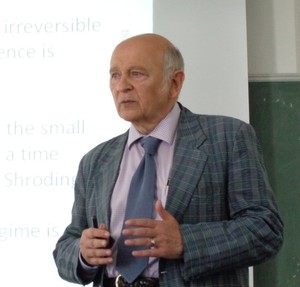About Institute / Doctors honoris causa / Jean-Pierre Badiali
Jean-Pierre Badiali
 According to the decision of the Scientific Council of the ICMP of NAS of Ukraine from Desember 20, 2013 the title of Doctor honoris causa is conferred on Jean-Pierre Badiali (Universite P. et M. Curie, Paris, France) for the basic
results which provided explanation and description of various types of
phenomena in electrochemistry, surface science and soft matter, for the
development of new successful approaches in statistical mechanics and for his
personal initiative and participation in different project aimed at strengthening
collaboration between France and Ukraine.
According to the decision of the Scientific Council of the ICMP of NAS of Ukraine from Desember 20, 2013 the title of Doctor honoris causa is conferred on Jean-Pierre Badiali (Universite P. et M. Curie, Paris, France) for the basic
results which provided explanation and description of various types of
phenomena in electrochemistry, surface science and soft matter, for the
development of new successful approaches in statistical mechanics and for his
personal initiative and participation in different project aimed at strengthening
collaboration between France and Ukraine.
Jean-Pierre Badiali was born on October 20, 1941 in the village of Mirande in the Midi-Pirenées region in France. Having graduated as an engineer from École Supérieure d`Electricité in 1970, he entered the Centre National de la Recherche Scientifique (CNRS) as a researcher. Here he pursued his scientific path starting from the position of “Stagiare de recherches” and moving up to the Research Director of Exceptional Class. He was a head of the lab at Université P. et M. Curie in Paris. J.-P. Badiali was elected as a member of the National Committee of the CNRS four times. From 1995 to 2000 he was the President of the Section “Molecules: Structure and Interactions” of the National Committee of the CNRS. Later, from 2001 to 2006 he was a member of the Scientific Council of the CNRS and was in charge of the group “Theory of Interfaces” at the “Laboratoire d’Electrochimie et Chimie Analytique” of École Nationale Supérieure de Chimie de Paris and Université P. et M. Curie. Since 2010 he has been working in this group first as a researcher and currently as an Emeritus researcher.
J.-P. Badiali started his scientific career with theoretical and experimental studies of dielectric relaxation of ionic solutions. After that a large part of his research was connected with the theory of electrochemical interface. In the early 1980s he proposed first calculations showing explicitly the role of electronic distribution in the electric properties of an ideally polarizable electrode. In order to investigate basic properties of a charged interface he developed an approach based on the methods of field theory. In the case of a simple interface J.-P. Badiali and his coworkers investigated the role of the adsorbate-adsorbate interactions in the structure of the interface especially when the substrate is not infinitely rigid. An illustration herein is the effect of adsorbate-adsorbate interactions on the roughening transition and the formation of a new structure in the substrate. A natural extension of this research was connected with investigation of the insertion of ions into a deformable host material. As a result, a coupling between electrical and mechanical properties was found. Such a coupling appears in the ion insertion processes, in the case of hydrogen sorption in pure metal or alloys and also in the charging/discharging processes developed in polymers grafted on a metallic surface. This represents a new field of investigations with which anomalous diffusion and possibly non-standard thermodynamics are associated. During the last decades J.‑P. Badiali considered different fundamental problems of statistical mechanics. These included the fractal structure of path integrals, calculation of entropy of black holes, the role of discreteness of space for quantum and statistical mechanics, time evolution of small reactive systems, the problem of irreversibility in statistical mechanics etc.
A continuous and fruitful collaboration of J.-P. Badiali with the Institute for Condensed Matter Physics (ICMP) of the National Academy of Sciences of Ukraine (NASU) has been going on since 1991. He attended many conferences in Lviv. He was also an active participant of various joint international projects. Among them there were two INTAS projects and project Eco-Net, in the framework of which the theory of corrosion developed by J.-P. Badiali and his group was used for the modeling of self-sputtering of nuclear materials. Due to the initiatives of J.‑P. Badiali the ICMP was a frequent participant of the CNRS-NASU collaboration. J.‑P. Badiali is a member of the Editorial Board of the "Condensed Matter Physics" journal. His support played an important role in the creation of the "Physics of Soft Matter" Council of NAS of Ukraine.